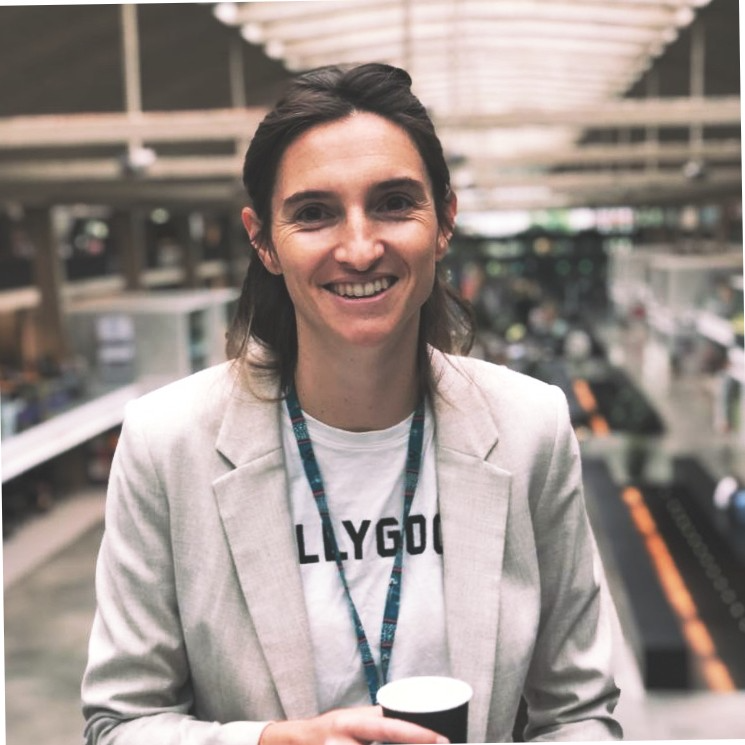Joséphine Goube, CEO of Techfugees talks to Lilian Poilpot, Partner at Erevena about coordinating the tech community to create technology for and with displaced people, and the opportunities that this has created for diverse groups.
Joséphine has been the CEO of Techfugees since the outset in 2015. She also sits on the board of the Norwegian Refugee Council and acts as an informal expert for the European Commission on migration reforms. Nominated as one of the top “30 under 30 Social Entrepreneurs” by Forbes in 2016, 2017 and 2018, she was also honoured as “Digital Woman” of the year in 2017 in France. She is an Alumnus from Sciences Po Paris and the London School of Economics.
Tell us a bit about Techfugees and how it came about
From 2012 to 2016 I was involved with Migreat, a London-based start-up specialising in helping people apply for visas for France, Spain, UK, Italy and Germany. I was interested in making visa requirements easy to understand, based around an algorithm, which proved really popular with over 2 million website visitors a month! I was interested in studying the website traffic to understand people’s migrations more and in 2014 identified a surge of visitors from Syria who were looking for visa information to help them on their journey to Europe. These people were seeking asylum status and as asylum law is very different from immigration law, we found we could not build an algorithm to help these people move safely. We needed to think differently to help people who were being displaced through no fault of their own.
Around the same time, I met Mike Butcher, Editor-at-large of TechCrunch in Europe, and we decided to do something together. The Techfugees organisation was created in September 2015 following a spontaneous shout out by Mike on Facebook in response to the picture of the lifeless body of the young Syrian boy, Aylan, washed up on a Turkish beach. A few days later, 300 people from the tech community came together in London for our first conference, followed by a hackathon. Many cities and countries across the world picked up the torch over the following weeks and it just snowballed from then and became an immediate success driven by the emotion of the time. I quit my job and assumed the CEO role and tried to catch up with the wave of inspiration, innovation and hope that we had sparked.
“Techfugees exists to empower displaced people with technology innovations designed by, with and for them.”
Techfugees is an impact-driven global organisation nurturing a sustainable ecosystem of tech solutions that supports the inclusion of displaced people who have been forced to move from their homes. We bring together innovators, humanitarians, researchers and social entrepreneurs, from both refugee and local communities, to create tech solutions together. Now we have a worldwide community of volunteers, from 10 countries across five continents, and have built an international organisation around the needs of the displaced communities that we work with, with the aim of establishing how technology can fulfil their needs and alleviate their suffering.
What are the priorities for you to address?
Technology has enabled a disruption in space and time which is revolutionary for displaced people. We only work in the 5 key areas where technology has this huge potential and can be safe for them to use. We care about:
Access to information, access to healthcare, access to education, access to employment and access to social inclusion.
Everything that technology does for us can be captured by the concept of access, it’s revolutionary.
Let me give you an example of access to information: one of our first hackathons built a website that’s translated into different languages giving displaced people the information that they need when they first arrive in a camp in Greece. It works like a website in an airport, in terms of that you don’t have to click on a link and log on. Everyone who arrives will ask for the wi-fi so that they can contact their family and when they log-on they automatically get taken to the website which will give them access to the information that they need in their own language.
Another example is providing access to translation services, as many people who arrive don’t speak the local language. As a person who’s been displaced you need to deal with lots of administration and the people you interact with don’t necessarily speak your language. Our app gives you access to a certified translator on demand to help with things like your asylum case or speaking to a doctor. It relies on trust, and you can have access to the same translator over time.
You have to think about how people who are limited in space and time need to operate. Innovation is co-constructed with the people that we are helping. We’ve accumulated a lot of knowledge on the way that displaced people use technology and collected information on how to do it safely and especially what not to do. We’ve built our own programming to deliver help directly to refuges. A number of start-up businesses have spun out of these initiatives, as well as some non-profit organisations.
What other initiatives has this led to?
One of our flagship programmes is the Women’s Fellowship, which has run in France for the last 3 years. TF4Women is a program of free 6-month support for displaced women, providing certified training on new technologies, in parallel with one-on-one mentoring and networking opportunities. Its main purpose is the professional inclusion of displaced women in the technology industry. Fellows are matched with a mentor for the whole duration of the programme in order to support their job search and help land their dream job in the tech industry. It’s a completely free programme for refugee women, we cover transportation and accommodation costs for the women living outside Paris and where necessary babysitting costs.
“We’ve been accelerating the professional inclusion of refugee women within the tech industry since 2018, and over 80% of fellows have gone on to find jobs in tech.”
We don’t select fellows based on education levels, although most are educated, we select them on motivation and transferable skills. For example, we have accountants who have transferred skills easily to data scientists. We’ve also helped mothers and women without degrees to become digital marketers, it’s all about their motivation.
How does this impact the lives of the women involved?
Most of our fellows come from a conservative society and have held more traditional roles. We talk to them as modern, empowered women which in turn helps them integrate into French society. Often, we find it’s the first time that they’ve been asked what they want to do with their lives. On the whole we have found any husbands to be very supportive and thanked us for taking their wives on the programmes as they are flourishing as independent women.
“I didn’t know we would tap into something so profound.”
What impact has Covid-19 had on your work?
We were concerned that during the global pandemic Covid would become the top issue for people and take the focus away from polio, malaria and famine which are the real killers of displaced communities. Plus, we were concerned that the lockdown would impact displaced populations who rely more on the informal sector for employment and they would therefore be unable to access work and pay rent.
We created a platform to collect data on the number of cases of Covid-19 in the camps and analyse the correlation between the policies passed and the Covid death rate to determine whether it helped to put camps into lockdown. The platform was built by over 85 volunteers to collect data from more than 25 countries, helping us to build a picture and develop a voice for the refugees.
We’re seeing the picture that most refugees are not being affected by Covid-19 (over 50% are under 18 who are typically asymptomatic) but they are being impacted by lockdown and the associated lack of freedom. This continued lockdown is in direct contrast to countries like Greece opening up their borders to tourists. It’s a very dire situation that we are watching closely.
What are your plans for the future?
Wars and climate change are already forcing millions of people to leave their homes every day, and by 2050, the World Bank estimates that 143 million people will be displaced by climate change alone. We have to face up to this new reality, it’s not just a temporary crisis. At Techfugees we believe we must now work at enhancing resilience and preparedness within communities and improve our ability to welcome people who are forcibly displaced. And we’ve proved that tech is the ideal way of giving people access to opportunities.
“We believe it’s a pragmatic answer to the new reality of migration.”
We’re gaining the momentum to scale into other countries, such as Italy and Greece, where the need is currently most acute. Our main challenge is to find the money to allow us to expand. We want to be independent of politics and state funding and closer to the private sector as that’s what helps our programmes to be successful.
How can companies or individuals get involved?
In many ways! For example, Erevena are advising and carrying out pro bono, a critical executive search for Techfugees’ future, to help us strengthen our leadership team to meet the demands of the organisation going forward. We would welcome financial support from tech companies to fund scholarships to help women refugees get into tech, and to supply employees who can give their time to act as trainers and mentors. We also need equipment donations, such as laptops and smartphones, as well as sponsorship for our hackathons.
Share this article:













